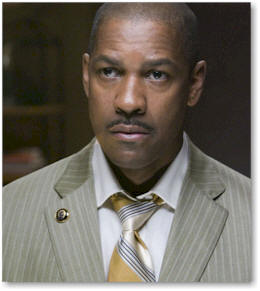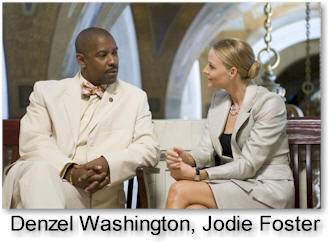Inside Denzel

Denzel Washington
The Inside Man Interview
Photo from Inside Man (2006):
Clive Owen, Denzel Washington, Jodie Foster, Spike Lee
Born in Mount Vernon on December 28, 1954, Denzel Washington was the middle
child of three children born to Denzel, a Pentecostal preacher, and Lennis, a
beautician. Denzel developed an interest in acting while attending Fordham
University, embarking on a career which need not be recounted here.
The two-time Academy Award-winner, who was named the Sexiest Man Alive by People Magazine in 1996, currently commands $20,000,000 per picture. Here, he talks about his latest outing opposite Jodie Foster in Inside Man, a cat-and-mouse crime caper directed by Spike Lee.
Interviewed by Kam Williams
Kam Williams (KW): How did you decide to do Inside Man?
Denzel Washington (DW): Spike called me up. I read it, and said, ’Yes.’ It's as simple as that.
KW: How much research did you do for this role?
DW: To be honest with you, I didn't do a whole lot of extensive research, because I just didn't have the time. I was doing a play on Broadway and had all of five days off before rehearsals, so I'm not going to sit here and tell you I did a whole bunch off stuff. We hung out with some New York City detectives. Part of the reason I liked the idea of doing the film was because it's very wordy. This guy talks a lot. And I was getting good practice playing Brutus. So, it's like, ’Shakespeare Goes to the Street.’
KW: What special training regimen did you do to play this character, Keith Frazier?
DW: None. I ate. [Laughs] I felt like he's sort of settled in his ways, and has his routine, and is in over his head. I was actually in better shape, and I sort of let myself go.
KW: How was it working with Spike? I heard that he allowed you to improvise several scenes. Were you comfortable with that?
DW: I actually started improvising with Spike some 17 years ago on Mo’
Better Blues. That was the first time I can remember really just setting a scenario and seeing what happened. I remember this scene where we were just coming off stage, and then we go backstage and I get into an argument with Wesley Snipes' character. That was one of the first times I sort of improvised. So, it all kinda’ started with Spike many moons ago.
KW: How was the chemistry between you and your co-star, Jodie Foster, another two-time Oscar-winner?
DW: Jodie's cool. I like Jodie. I like her a lot, and obviously, she's a great actress. So, I was excited about the opportunity to work with her.
|
|
KW: And how was it improvising working with Chiwetel Ejiofor?
DW: Chiwetel is really an elegant and good man, and a great actor. It was tougher for him, because I was just riffing, and he has this accent. So, he didn't know what I'm going to say, and he was trying to learn how to speak American. He had to go back over to his speech coach and figure out how to respond. So, it was more difficult for him, but he's a good man, so we had a good time together.
KW: What did you think about the Academy Awards?
DW: I didn't watch the Academy Awards. I went to Tower Records and I was teaching my daughter how to drive.
KW: How did you feel about It's Hard Out Here for a Pimp being performed and winning for best Song?
DW: I didn't watch the show, so I can't comment on what the show was about, but I'm happy for the people who won.
KW: A lot of black people feel that the Academy only honors African-Americans for work which presents their own people in a negative light. You played a corrupt cop in Training Day, Halle Berry got naked in Monster's Ball. And now that pimp song. Do you agree?
DW: I won the first time for Glory. wasn't that positive?
KW: Yeah, but do you think there might be any truth to the perception?
DW: I don't know if there's any truth to it, but I think they have the right to feel that way. I don't sit down with all the voters, and poll them, and I can't speak for what people think. It's not like we all get together for a Hollywood meeting to decide. To be honest, I don't know what people think.
you'd have to ask individuals.
KW: How else can you explain it?
DW: I think sometimes you are awarded something over here when you should have won over there. I don't think that's new with me. I don't think Scent of a Woman was Al Pacino's greatest performance, but that's what he won for.
If I had been in his shoes, would people have said it was because it was race? You know what I mean?
KW: Yep.
DW: He’d been nominated eight times. If that had been me, and I'd been nominated eight times, would people say it was a racial issue? I think there's something to be said for the ’We owe you one’ issue. Plus, people like the bad guy. I certainly did. [Chuckles] I enjoyed Training Day. That was one of my favorite parts. I liked it. I had a good time.
KW: Out of all the roles you've played, which one is the most like the real Denzel?
DW: Training Day. [Laughs again] I love saying that. There's no one part.
I'm not those people, I just portray those people. They affect you, and they all become a part of you. But I can't say I ’m closest to any particular one. I'd like to think that I'm doing something different from myself and not just trying to bring me to that character.
KW: What are you working on now?
DW: I'm working now in New Orleans with Tony Scott. We did Man on Fire together, and Crimson Tide. This [D’j’ Vu] is an interesting picture, technically.
KW: How so?
DW: It's strange. It takes place in different times. It's like a reverse love story.
KW: What genre?
DW: I wouldn’t know what you'd call it. But there's some new technology that he's using, and it's wild.
KW: What's it about?
DW: Without giving it away, I can say that it takes place over four days and it moves around in time.
KW: What's New Orleans like?
DW: It's interesting. It's a tale of two cities. Downtown, most of the Garden District and the French Quarter are pretty much intact. I mean they still have hurricane damage, wind damage, or whatever. And then there's the rest of the city, 80% of the city. Mile after mile after mile after mile of empty homes.
KW: Have you spoken to folks out there?
DW: Well, riding around, there aren’t a lot of people out there to talk to.
I like getting in my truck and just riding around, but I try to leave people alone. What do you say?
KW: How are the people's spirits?
DW: It seems like they’re trying to put it together. I went to a basketball game the other night, the New Orleans Hornets first game back in town. There was an energy there. It was like a reunion of a lot of people who hadn’t even seen each other in a long time. And then, of course, you have the hundreds of thousands of people who aren’t back. So, I don't what they’re going to do, but it's going to take a long time.
KW: What's on the horizon for you, American Gangster?
DW: Yeah, that announcement ought to be soon, but it looks like it's a done deal, with Ridley Scott directing, and me and Russell Crowe, this fall, here in New York.
KW: Which of your movies was your favorite to make?
DW: I don't pick one. I'm just blessed to have traveled the world and to have had so many great experiences. I think landing in Africa to make Cry Freedom had the greatest impact on me. It's been a great life, I've been very blessed.
Related Links
Denzel Washington - The Equalizer Interview (2014)
Denzel Washington and Russell Crowe - The American Gangster Interview
THE HURRICANE (1999) - Film Review
A Hand to Guide Me: Legends and Leaders Celebrate the People Who Shaped Their Lives
A book by by Denzel Washington with Daniel Paisner
